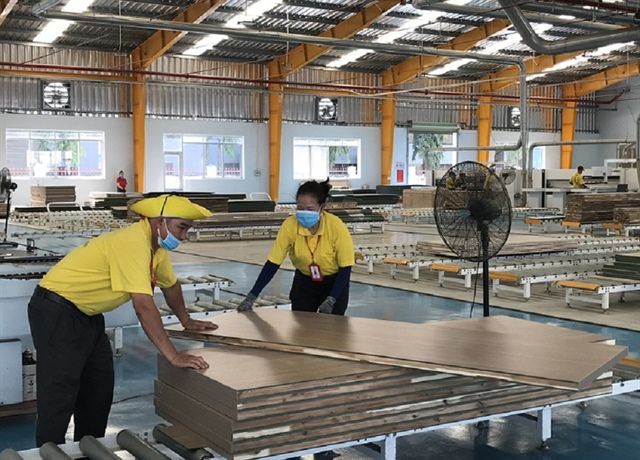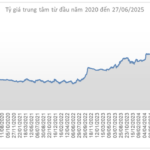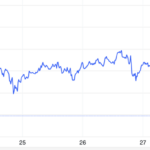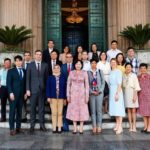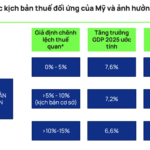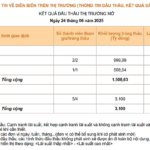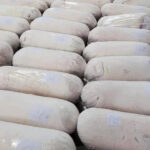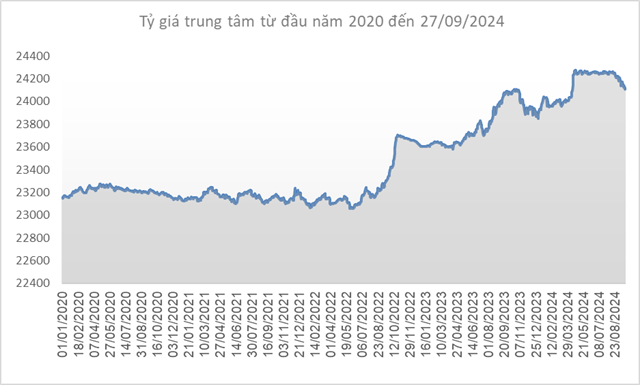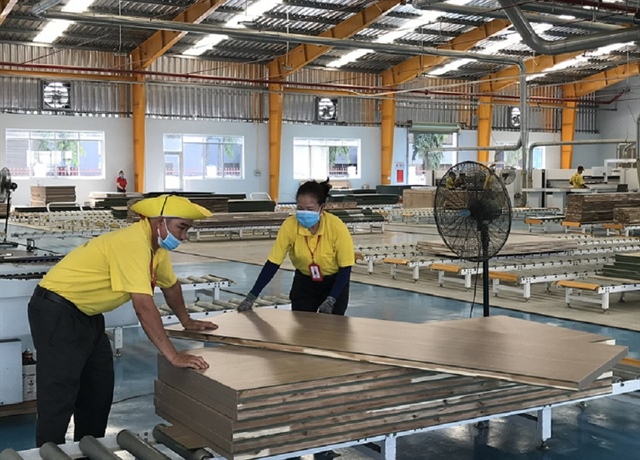
Several exporters of wooden furniture are facing challenges due to a decline in orders. Illustration photo: H.Nhu |
In early June, Mr. Hai, director of a furniture company in Binh Duong, is considering downsizing his factory. Orders from Europe and the US have decreased by more than 30%, while material and transportation costs remain high.
“We used to plan to borrow money to expand our production lines, but now we dare not take the risk. No one borrows money to make products when there are no buyers,” he said.
Mr. Hai’s story is not an isolated case. It reflects a worrying reality: a lot of money has been pumped into the economy, but the flow is being obstructed. When money does not reach the right places, it can create asset bubbles instead of boosting production.
In the first five months of the year, more than a million billion VND was injected into the economy through credit channels. Credit growth exceeded 6%, indicating that the State Bank has maximally loosened monetary policy to rescue economic growth. Interest rates have fallen, and exchange rates have been kept flexible – all conditions have been created for cheap capital to flow into the economy.
However, the expected outcome has not materialized. The money mainly flowed into real estate, securities, and short-term consumption – areas that are profitable and less risky. Meanwhile, manufacturing enterprises, especially small and medium-sized enterprises, face difficulties in accessing capital. It’s not that banks refuse to lend, but because businesses are reluctant to borrow due to a lack of output, declining orders, and weak market confidence.
Key export industries such as textiles, wood, and electronics are struggling. Some businesses are losing orders due to technical barriers – from ESG to the carbon border adjustment mechanism (CBAM) – which are presenting Vietnamese enterprises with a new door to globalization, but they lack the “keys” to enter. This is in addition to the uncertainties surrounding the US tax policies and the conflicts in the Middle East.
On another front, public investment – an important channel for capital flow from the state – is lagging. Ho Chi Minh City, the country’s economic center, has only disbursed over 10% of its public investment plan in the first five months. Numerous transportation, canal, school, and hospital projects remain on paper due to legal, land, and coordination issues between departments.
The budget is available, and the political determination is clear, but the implementing apparatus is still confused in the administrative machine. Meanwhile, many projects have been started but have not yet created a spillover effect on the private sector.
Another indicator suggesting the economy’s weakness is the number of businesses leaving the market. More than 111,000 businesses temporarily ceased operations or dissolved in the first five months, a 14% increase from the same period. Most of them are small, agile businesses, which are considered the driving force of the economy.
This means that while money is being pumped out at a record pace, tens of thousands of businesses are exiting the market because they cannot access capital or because they have no reason to exist in a weak consumer market.
Not only businesses but self-employed workers, small traders, and micro-business households – the backbone of domestic consumption – are also facing new pressures from tax policies. Some localities’ push to abolish the lump-sum tax and switch to monthly tax declaration has created significant concern among small traders.
For small traders without proper invoices and documentation, monthly tax declaration is impossible. In this context, Deputy Prime Minister Ho Duc Phoc’s proposal to continue the lump-sum tax for households with a turnover of less than VND 1 billion is reasonable and necessary.
If not timely adjusted, the tax policy may inadvertently stifle the economy’s sidewalk economy – which provides a livelihood for millions and absorbs most of the daily consumer spending.
From a macroeconomic perspective, when there is more money than goods, inflation is challenging to avoid. In May, the consumer price index rose by 3.24%, the highest in the last four months. The prices of essential goods are quietly escalating, while people’s incomes remain unchanged.
The personal income tax exemption has been “frozen” for 11 years, increasing the spending pressure on middle and low-income earners.
The core issue lies in the fact that monetary policy has been loosened to its maximum extent, but fiscal policy – although promoted – has not yet created a strong enough boost due to delays in construction and disbursement issues. When private consumption, investment, and exports are all weak, fiscal policy needs to be more proactive in stimulating demand and channeling money to where it is needed most.
We have no shortage of money. Vietnam lacks a flexible and effective mechanism to direct money to the right places. First, we must remove the bottlenecks in public investment disbursement, from legal procedures, bidding to personal accountability. Next, we should reorient credit priorities towards manufacturing, green technology, and social housing instead of continuing to fuel speculative channels.
Equally important is reforming personal income tax policies and maintaining stability for small businesses – those bearing the economy’s burden daily but not yet supported proportionately.
Without a timely and synchronized policy shift, the economy will continue to depend on pumped-out money without absorption, creating inflation risks and instability.
Money has been pumped out. The question is no longer “whether to pump more or not” but “how to ensure the money reaches the places that need it most.”
Dinh Hong Ky – Vice Chairman of HUBA
– 19:00 30/06/2025
Gold Prices Slide Below $3,300/oz as US-China Trade Tensions Ease
The behemoth gold fund, SPDR Gold Trust, displayed its prowess in the latest trading session and throughout the week by engaging in substantial net purchases.
“In Collaboration with the IMF: Governor Nguyen Thi Hong Emphasizes the SBV’s Monetary Policy Orientation.”
“At the reception, Governor Nguyen Thi Hong emphasized the proactive and flexible approach taken by the State Bank in conducting monetary policy. Through timely support of liquidity for the credit institution system, they have effectively contributed to curbing inflation, stabilizing the macro-economy, and facilitating businesses’ access to credit.”
The Perils of Inflation and Exchange Rate Hikes: Challenges for Sustaining Low-Interest Rates.
The currency market is under pressure as domestic USD rates move contrary to global trends, despite the USD-Index falling over 10% since the start of the year.

